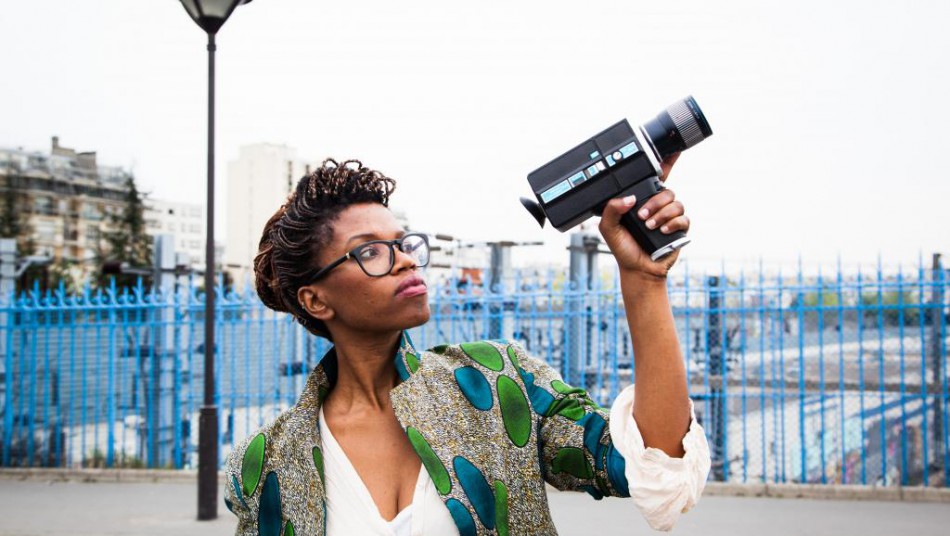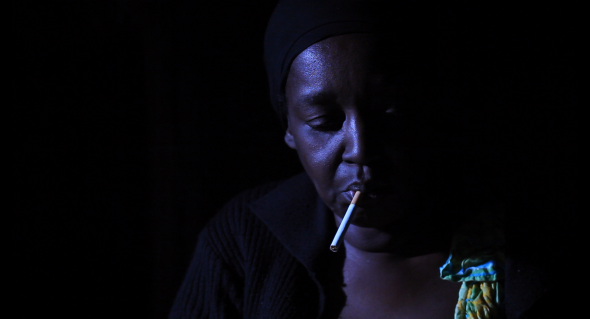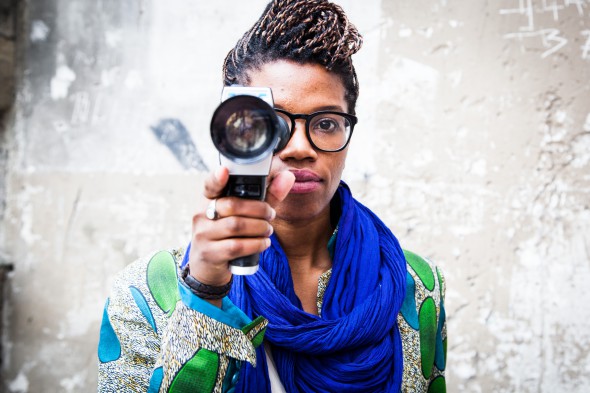In Senegal, when President Abdoulaye Wade wanted to run for office yet again in 2011, a resistance movement formed on the streets. Shortly afterwards, a group of school friends, including rappers Thiat and Kilifeu, set up ‘Y’en a marre’ (‘We Are Fed Up’). Filmmaker Rama Thiaw soon came on board to start documenting events (meetings, campaigns, arrests, concerts, states of exhaustion, trips) from an insider’s perspective. This documentary is the second volume of Rama Thiaw’s trilogy of documentaries, where she highlights the relationship between politics and culture. It started with ‘Boul Fallé, the Way of Struggle’ shot in 2009, and the third volume of this trilogy will follow 6 reggae musicians in different countries. ‘The Revolution Won’t Be Televised’ was presented at the 2016 Berlinale and won the Prize of Critics from ‘FIPRESCI’ in the Forum category and a mention from Caligari Filmpreis. Rama Thiaw offers a truly aesthetic documentary, where she narrates a part of Senegalese history and explains how her home country is about to change.

Portrait of Rama Thiaw // Photo by Camille Millerand
Marc Girardot: In your documentary ‘The Revolution Won’t Be Televised’, you are following the evolution of the civil movement ‘Y’en a marre’ in Senegal founded in part by rappers like Thiat and Kilifeu from Keur-Gui Crew. You met them in 2010 and asked them if they were up for having you make a film made about them.
At that time ‘Y’en a marre’ hadn’t begun yet, but you told them that it would be better to film during the election period of 2012. What sparked your interest in these people? Could you explain how you already noticed, at that moment, that these guys would have an important role to play in terms of political issues in Senegal?
Rama Thiaw: Thiat and Kilifeu had a long career of 20 years doing music and being activists. So I knew that they would do something, and it was logical that they would make something huge during the election period. They were the first ones who criticized President Wade, but they also criticized the president before Wade, Abdou Diouf. They were never afraid of telling the truth. But I didn’t expect that they would start such a big civil movement. It was a surprise for me also because we Senegalese are not in the habit of demonstrating on the street. It wasn’t a part of our habits before ‘Y’en a marre’. But, those guys gave us this idea. It was also a really new thing, because there were a lot of women and old people who were on the street with young people. It wasn’t only a youth movement.
MG: Watching your film, you can imagine that the filming conditions were quite hard.
RT: The conditions were awful. First of all, we didn’t have a lot of money. I had to pay for the first shooting during the election period myself. So I had to hire a very young and mostly inexperienced crew. It was their first experience shooting a feature-length documentary. That was the first problem! I also wanted to shoot with some aesthetics. We did a lot of work on the aesthetic of the film. It was really important for me to highlight the brown skins in this film. Sometimes we didn’t have time to make the right calibration because there were shots being fired, there was gas, there were policemen running after us. It was chaos in the country. I really had to anticipate when shooting my scenes and sequences. Sometimes we also had to shoot when it was 50 degrees. It was an exhausting shoot.
There were six men and I was the only woman on this team. Here in Senegal, people don’t give credit to women. Even if you are a black woman, they think that you don’t know anything about the technical aspects of sound, camera or shooting. They always think that you are the assistant to the cameraman. That was also one of the major difficulties.
MG: You chose the title ‘The Revolution Won’t Be Televised’ from Gil Scott Heron’s song. This text is considered to be one of the first rap songs. As we all know, rap comes from ghettos in the US. It was a way to bring up a number of issues and injustices in our society for those whose voice wasn’t heard by anybody. After the global popularization of hip hop, the aim of the genre changed a bit. It became more about your personality, your success, your wealth and way of life…Would you say that hip hop went back to its original message with the activism of ‘Y’en a marre’?
RT: It is important to say that we called Gil Scott Heron the grandfather of rap because he was doing it for words, which is not exactly true of hip hop. The first hip hop song was an entertainment song. The first hip hop record was a really fun record, not at all political. The second wave of hip hop became political with Africa Bombaataa (founder of Zulu Nation), KRS-One and so on. It is this wave that we called conscious hip hop. Thiat and Kilifeu feel they make hardcore hip hop with consciousness. For them, that’s the real hip hop! This is the reason they say: “We will be the guardians of the temple, the orthodox one.”.
The title of this song, the text of Gil Scott Heron and what was going on, it was quite the same for me. Gil Scott Heron was also a member of the Black Panthers before becoming an artist. In this text he talks about that, how the media in the U.S derided and categorized the black activism movement. I found the same echo with what happened here. Around that time, the media said that Black Panthers were just violent, but they didn’t talk about the social issues that the black panthers were struggling with and what their ideology was.
When I wanted to shoot the movie it was in 2009. In 2010, we chose to shoot during the election period of 2012. When I arrived, there were already many different teams of journalists shooting the ‘Y’en a marre’ movement. They felt much more legitimate than me. That’s also why I called my film ‘The Revolution Won’t Be Televised’. It was so funny to see so many journalists over there, and to realize that no one had heard about our revolution in a proper way. They never showed the deep side of what was going on in Senegal. All of this made me laugh. At the same time, Gil Scott Heron died in 2011.
MG: This film deals with Senegal and was made by Senegalese people so your documentary has an obvious historic credibility to it. Was it your first intention?
RT: Yes! I wanted to show my history. It was really important to have these facts that future generations could rely on when they want to know about their history. Because all the facts and images that we have about our history have been made by white men. We need to tell our history with our own voice. I think that’s the difference between my film and the others. I believe that it could be a really interesting workshop to screen all the films about the Y’en a marre movement. I am sure it would be very funny!
MG: You have structured the narration of your documentary through a letter of Khady Sylla (writer and filmmaker from Senegal). This letter is addressed to Thiat and she explains that Senegal already has some revolutionary figures like Omar Blondin Diop among others and that Senegal will see more revolutionary characters emerge after ‘Y’en a marre’. What kind of impact does Senegalese culture have on political issues?
RT: First, Khady Sylla is the bridge between two generations of revolutionaries, but also of artists. Blondin Diop was the founder of the Maxist-Leninist Party in Senegal. He was also an actor and he played in a film by Jean-Luc Godard, ‘La chinoise’, in 1967. What I wanted to show is that music and art in my culture aren’t only a form of entertainment. There is a direct linked to social and political issues. Because music is a vector for giving information (political, historic…).
Many people are illiterate in Senegal (54% of the population). So we have this tradition of aural transmission. Through music, we can share and spread information. Even if we have political meetings, there will be a musical show before. If you want to have an impact here, you need musicians with you: this is the DNA of our social and political life. That’s why there is no difference here between culture and politics.
MG: ‘The Revolution Won’t Be Televised’ presents a high level of intellectual thought. Through the eloquence of Khady Sylla, through the activism of the ‘Y’en a marre’ crew, the richness of the Wolof language which comes through in their texts, the emancipation of Senegalese people…You are fighting against the stereotypes which have been associated with African people, both in film and in Western societies in general for a very long time. In 2016, do you still get offended by some films that give a bad image of African people?
RT: In the new biopic of Nina Simone, it seems we are still in the same time that we were in 1930, with white people who painting their faces to play black people. I mean, what is going on? We do have great black actors, we do have great directors, we do also have producers. So why can we not put the three all together and make great films?
I wanted to make this film in a technical way. The trick is that most of the time people would say: “Oh, it’s an African film.”, in order to say “it wasn’t well made but you know they are African, they are poor”. I didn’t want to hear that kind of judgment about my film. I said to myself that I would prefer that people don’t like my documentary for good reasons, rather than this one. I fought a lot to find the budget, which was huge for a documentary. It took me six years to get this money. We just have to fight to make films!
If we look at the film industry, 80% of it is dominated by white, older men. Then, there are few places for women in general, even white women. There are few places for black men, and a very small place for black women. But, there is a difference between Afro-American and African people. We are the niggers of the niggers on earth, that’s the problem. It is so true! So, as we are only a few, no one will take the risk to put a high budget on our films. This is the major problem we face nowadays. Films are related to an industry. We need money to make good films.
On the other hand, we have a problem of awareness because there are rich black people even in Africa. But the rich African people won’t put money in cinema or in culture because they don’t care. They prefer to put money in politics or to make much more money because they don’t care about our culture, about their own culture. So, we need to raise awareness, for the rich African people to invest and act like patrons of our culture.

Khady Sylla, Rama Thiaw: ‘The Revolution Won’t Be Televised’, 2016 // courtesy of the artist
MG: After the screening of your film at Berlinale, you had to answer some questions. One journalist asked you why you filmed more men than women in your film. I noticed that you were a bit annoyed by this question and you said that we should start to structure the concept of feminism. What is your definition of feminism? How should we structure and develop it?
RT: This question is a good one in the current context. First, I would like to give an example that I often use: Joseph L. Mankiewicz, who is one of the most respected directors in Hollywood, spent all his life filming women. Nobody ever asked him why he made this choice. So, why, as women, should we only film women? Why, as Africans, should we only film Africans?
I feel like a human being above all. It defines me more than my gender, my sexuality or whatever. I think that humanity will go forward the day that each of us will be seen for his human kind, not his gender, not his skin’s color, not his territory. We have to have a global fight, not divide all our fights. Because if gay people fight on their side, white women on their side, black women on their side, Asian women on their side, poor and uneducated people on their side, we will end up all being divided. But if we are all together we can structure our world.

Portrait of Rama Thiaw // Photo by Camille Millerand
When I said that we need to structure feminism, it is because there is no universal concept. We live in a world of standardization. We think that all our fights are uniform and homogeneous. People think that you can just adapt the struggles against some of the issues that people are experiencing in western society, to other place on earth. But, it doesn’t work and it just won’t work! When we do that, we forget about the cultural aspect of the problem. Let me give you an example with feminism. What it means to be a feminine woman completely depends on culture. To be feminine in Europe is absolutely not the same as being feminine in Senegal. Here, to be feminine, a woman has to know how to fight with their own fists. That’s completely not a part of the feminine definition in France, for example, where women have to be sweet and gentle in a way to be considered as feminine. So, we are not talking about the same concept of feminine. We just can’t bring this western version of feminism to every place around the globe.
Another example: in Senegal we don’t have any problem of parity between men and women at the National Assembly like in France. Nevertheless, we have other problems: abortion isn’t allowed by Senegalese law. So, our struggles are not the same because our situation and our culture is different. This is the reason why I said that we have to structure our feminism. In my opinion, the real feminism is above all a humanism. We shouldn’t build feminism in opposition to men because it is us, women, who are educating men. The first thing that we have to do is to educate women, to make them able to educate men properly. If we want men to change, we have to educate them differently.
We are living in an era of standardization. We would like that all struggles, tastes, and cultures are standardized. In that sense, we are loosing our specificity. The real fight is to be singular, to be different, and to be equal in our differences.
























